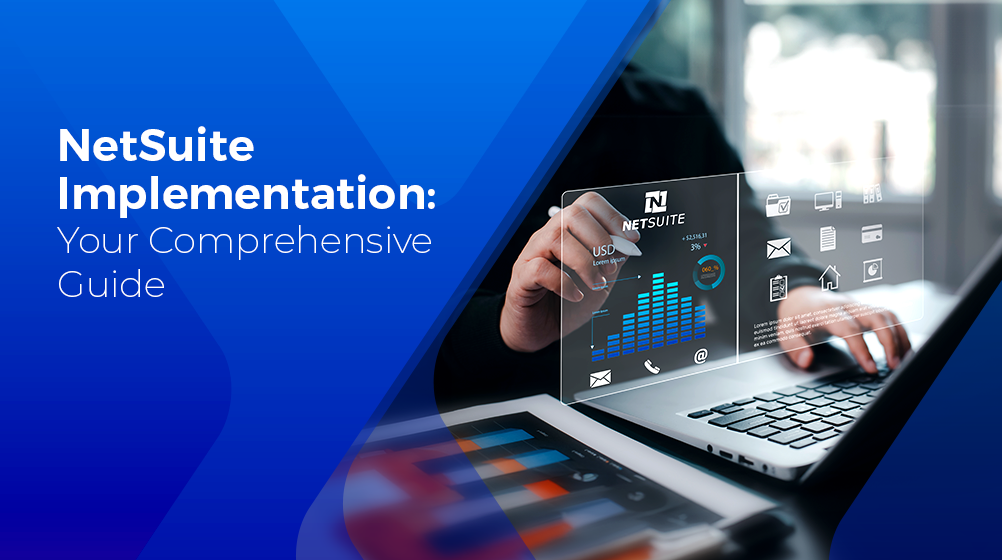Your NetSuite Implementation Guide for a Smooth Transition

Table Of Content
- What is NetSuite Implementation?
- How to Implement NetSuite?
- How Long Does it Take to Implement NetSuite?
- Cost Considerations for NetSuite Implementation
- To Conclude
According to Thomson Data, implementing NetSuite ERP has become indispensable for businesses worldwide, with over 31,000 companies and subsidiaries across 217 countries leveraging its capabilities as of 2023. Despite its widespread adoption, the implementation process can take time and effort. Reports indicate that 87% of companies seek comprehensive guidance for ERP implementation, while 67% specifically need help with ERP planning. These challenges underline the importance of a structured approach to ensure a smooth transition. In this NetSuite implementation guide, we will discuss the NetSuite implementation process and provide insights into the implementation costs to help you navigate these challenges and maximize your investment in this powerful ERP system.
What is NetSuite Implementation?
NetSuite implementation refers to the process of deploying NetSuite’s cloud-based Enterprise Resource Planning (ERP) software in a business environment. This involves configuring the software to meet the specific needs of the business, migrating existing data, integrating with other systems, and training users. The goal is to leverage NetSuite’s capabilities to streamline business processes, enhance efficiency, and provide real-time visibility into operations.
How to Implement NetSuite?
The implementation process of NetSuite ERP typically involves the following steps:
Initial Consultation and Planning: The initial consultation involves understanding the business needs and objectives to tailor the NetSuite ERP implementation accordingly. Detailed planning ensures all requirements are identified, and a clear roadmap is established for the project.
System Design: System design focuses on customizing NetSuite to fit specific business processes and workflows. This phase includes configuring modules, setting up user roles, and designing custom reports to ensure the system meets all functional requirements.
Data Migration: Data migration involves transferring existing data from legacy systems into NetSuite. This process requires careful planning to ensure data integrity, accuracy, and completeness, often involving data cleaning and validation steps.
Integration: Integration entails connecting NetSuite ERP with other existing business systems, such as CRM, eCommerce, and HR systems. Proper integration ensures seamless data flow and communication between different platforms, enhancing overall efficiency.
User Training: User training is essential to ensure that employees can effectively use the new ERP system. Training sessions are conducted for both end-users and administrators to familiarize them with system functionalities and best practices.
Testing and Validation: Testing and validation involve rigorous checking of the system to ensure it meets all specified requirements and works as intended. This phase includes functional testing, performance testing, and user acceptance testing to identify and resolve any issues before going live.
Go-Live: The go-live phase is when the NetSuite ERP system is officially launched and made available for daily business operations. This phase requires careful monitoring to address any immediate issues and ensure a smooth transition from legacy systems.
Ongoing Support and Optimization: Ongoing support ensures continuous system performance through regular maintenance, updates, and troubleshooting. Optimization efforts focus on refining system functionalities and processes to enhance efficiency and adapt to evolving business needs.
How Long Does it Take to Implement NetSuite?
The implementation timeline for NetSuite can vary depending on the complexity of the business processes and the scope of the project. On average, it can take anywhere from three to six months. Smaller implementations may be completed in as little as two to three months, while more complex projects involving extensive customization and integration can take up to a year.
Cost Considerations for NetSuite Implementation
The cost of implementing NetSuite ERP can vary widely based on several factors:
Scope of the Project: The cost of implementing NetSuite ERP depends heavily on the size and complexity of the company. A larger company with complex operations will require a more comprehensive implementation, driving up costs.
Licensing Costs: NetSuite uses a subscription-based licensing model, where fees are paid annually. The overall cost will vary based on the number of modules and user licenses required.
Consulting Fees: Hiring a certified NetSuite ERP implementation partner is crucial for a smooth rollout but adds to the overall cost. The fees are typically based on the number of consulting hours needed for the project.
Data Migration: Migrating large volumes of data from legacy systems can significantly impact implementation costs. Additional expenses may arise from ensuring the data is cleaned and accurately transferred.
Training: Employee training sessions are necessary to ensure effective use of the new ERP system. Specialized training for system administrators and IT staff will also contribute to the total cost.
Ongoing Support: Ongoing technical support and troubleshooting are essential to maintain system performance, adding to the long-term costs. Regular system maintenance and updates are also necessary to keep the ERP running smoothly.
To Conclude
The implementation process can be time-consuming and costly, but the benefits of streamlined operations and real-time visibility make it a worthwhile investment for businesses aiming to optimize their processes. Therefore, choosing the right NetSuite consulting partner is crucial for a successful deployment.
At Power Cloud Consulting, we ensure a seamless NetSuite ERP implementation process tailored to meet the specific needs of your business. Our approach includes detailed planning, thorough data migration, and system integration, coupled with extensive user support. With our track record of successful deployments across various industries, we help organizations unlock the full potential of NetSuite ERP, driving efficiency and growth. Partnering with us guarantees a smooth transition and maximizes your return on ERP investment.


